
Build a Holiday Campaign in Klaviyo (Step-by-Step with Guide)
Oct 16, 2025 | 7 Min Read
One tip: Don’t buy a POS system unless it’s enabled with a CRM.
A CRM-enabled POS helps you target promotions based on buying habits, reward customers, and make data-driven inventory decisions. When used together, these systems can drive a sales increase and maximize customer retention.
You likely know what a CRM and a POS system are. But you might be wondering what a POS-based CRM is. We’re going to lay that all out for you now. Keep reading to learn about the CRM tools available in POS systems, why you need them, and specific ways you can use them to grow your business.

While both play a role in increasing retail sales, they tackle different aspects of the sales process.
Here’s a quick breakdown:
Think of your POS system as a modern cash register. A POS manages sales, offers integrated payment processing, tracks inventory, and prints receipts.
Its primary role is processing transactions. However, modern POS systems do everything from pricing management to creating accounting reports. Every brick-and-mortar shop needs a retail POS system.
A CRM (Customer Relationship Management) system is a tool that helps businesses manage interactions with customers and streamline operations. It centralizes customer data, automates tasks, and improves communication between sales, marketing, and customer service teams.
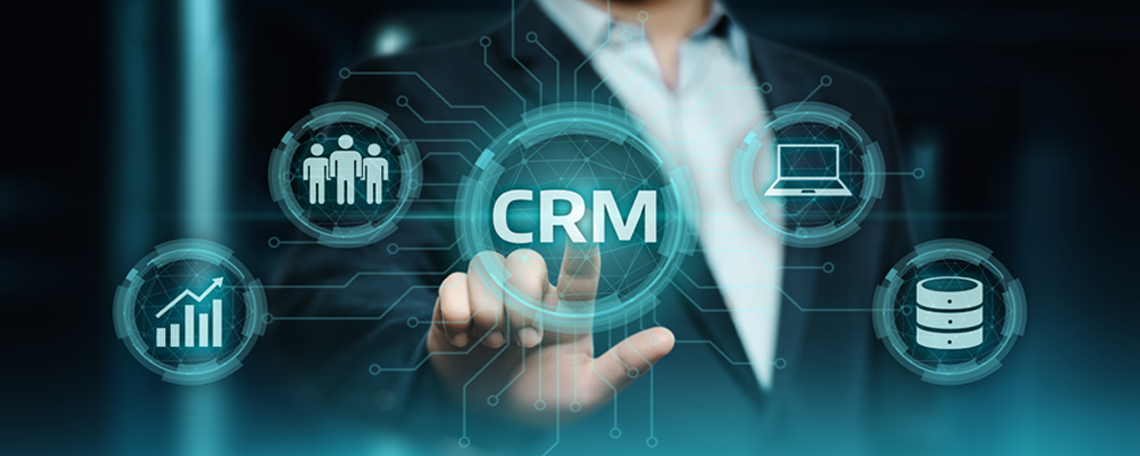
Popular CRM platforms include Salesforce, a widely used enterprise solution; Zoho CRM, known for its affordability and customization; Monday CRM, which offers a highly visual and flexible approach; and eLead CRM, tailored for the automotive industry.
While these systems are powerful, they often require integration with your point-of-sale (POS) machine, which can add complexity and require additional setup.
Using a CRM, you can build personalized marketing campaigns, offer targeted promotions, and drive repeat business. One benefit: When you use a POS CRM, the system is seamlessly integrated, capturing customer data at checkout without extra steps, creating a more efficient and hassle-free experience.
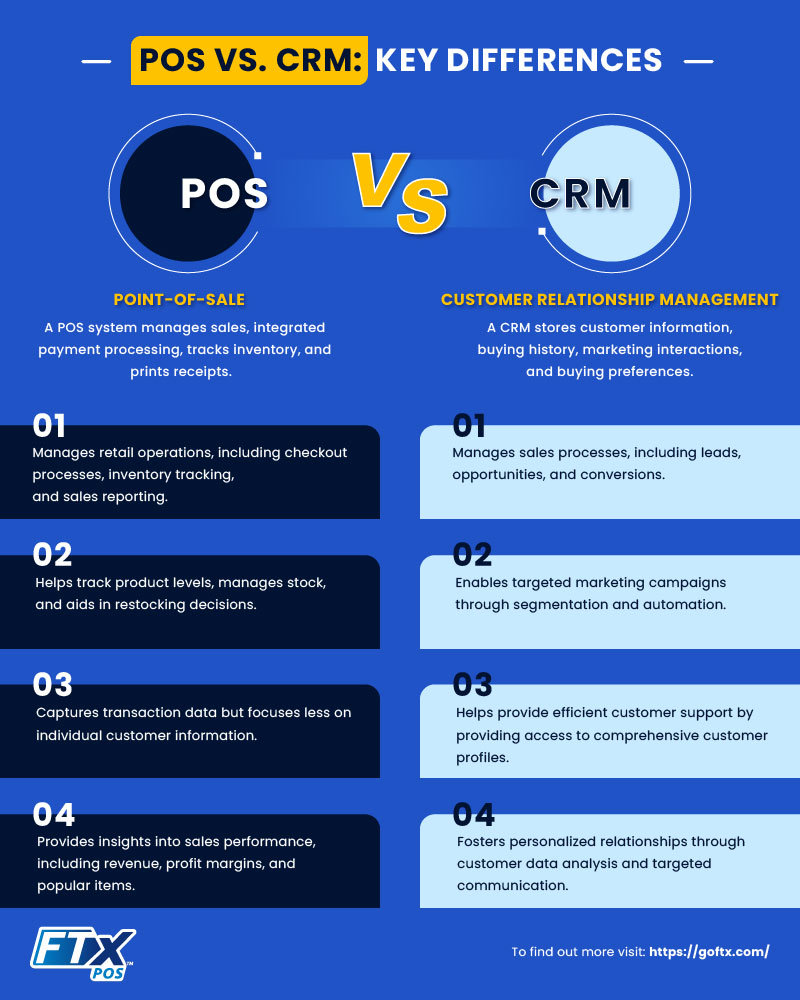
POS and CRM systems are the perfect match. An integrated system offers numerous benefits:
By adding CRM features, you’ll expand its marketing capabilities and gain better insights into your customers. These benefits will help you maximize sales.

Standalone CRM systems can be very powerful. But generally, retailers don’t need the more robust features of a dedicated system. That’s why a POS with built-in CRM tools makes sense in retail.
Modern POS systems typically include features like:

You might be wondering: What’s the difference between a CRM-enabled POS and a POS loyalty program?
Generally, a POS system with CRM tools includes only the storing and collecting of data, e.g., customer profiles, purchase history, and, potentially, marketing capabilities. A POS with loyalty features, however, allows you to collect CRM data and offer rewards for repeat business.
Upgrade Your POS. Choose a point-of-sale system that will help you grow! FTx POS includes CRM and rewards tools to grow your customer database at the register.
Staying competitive means more than just offering great products or services – it requires smart tools that streamline operations and deepen customer relationships.
This is where the combination of a CRM POS system comes in handy for retailers. By combining point-of-sale CRM capabilities with customer relationship management, businesses gain real-time insights, automate workflows, and deliver personalized experiences.
Below, we explore five actionable strategies to leverage CRM POS software and outperform competitors.
A modern CRM POS system isn’t a one-time solution – it must evolve with your business. Providers regularly release updates to improve security, add features, or refine user interfaces.

Even the most advanced point of sale CRM won’t deliver results if your team isn’t trained to use it effectively. Regular training sessions and accessible support ensure employees maximize features like customer data tracking or inventory management.
Many providers offer onboarding resources, minimizing downtime and empowering staff to resolve issues quickly, keeping operations smooth and customers satisfied.
The true power of a CRM point of sale lies in its ability to turn raw data into actionable insights. Track sales patterns, customer preferences, or peak shopping hours through built-in dashboards.
For example, if analytics (or features like FTx POS’s business intelligence (BI) inventory sales forecasting tool) reveal that 60% of repeat customers buy a specific product, you can create targeted promotions to boost loyalty. This data-driven approach helps you allocate resources smarter and refine marketing strategies.
Standalone POS CRM software is good, but one that integrates with your existing tools (like email marketing platforms or accounting software) is game-changing. Sync customers purchase histories with your email CRM to send personalized offers or automate inventory reordering when stock runs low. Seamless integration eliminates manual data entry, reduces errors, and frees up time to focus on growth.
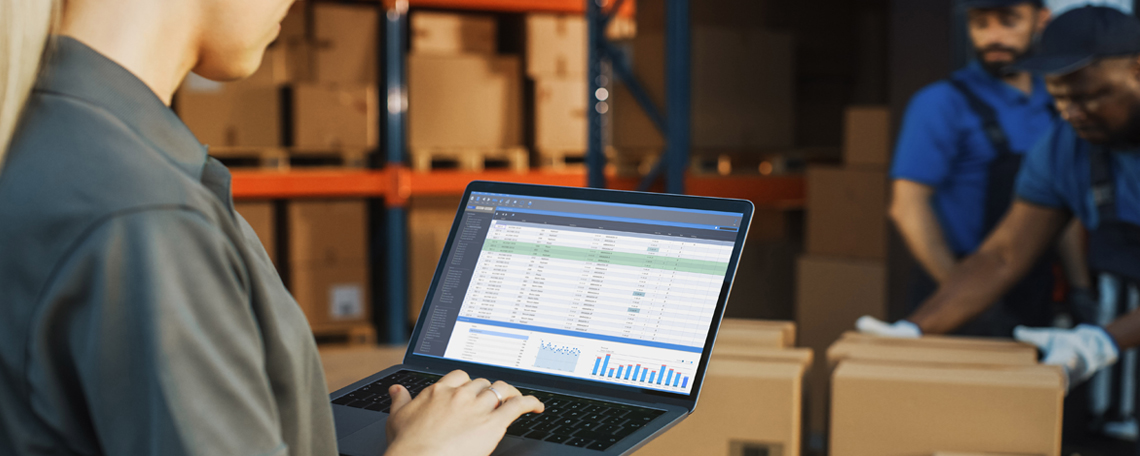
Forward-thinking businesses use CRM and POS systems to adopt innovations like mobile POS, AI chatbots, or contactless payments.
AI-powered tools can predict demand spikes, ensuring you’re never understocked during busy seasons. Staying tech-savvy not only impresses customers but also future-proofs your operations.
By implementing these strategies with a CRM POS system, businesses can streamline workflows, delight customers, and adapt swiftly to market changes.
Generally, retail businesses using a POS system don’t need advanced CRM features. This is because the sales cycle is generally shorter, and the products and services require less selling.
For example, an independent grocery store doesn’t need lead management tools. Instead, small business retailers need a CRM that allows you to:
Additionally, a POS-enabled CRM saves small businesses from investing in two software systems. This can save time and money. Larger businesses, B2B companies, and companies with longer sales cycles, however, would typically need a dedicated CRM platform.

A POS-based CRM isn’t just about storing information. It’s about transforming data into growth for your business. Here’s how:
Imagine sending emails showcasing products similar to a customer’s recent purchase or offering birthday discounts. POS data unlocks this level of personalization:

Loyal customers are gold. A POS-based CRM helps you build customer loyalty via:
The combined power of POS and CRM data creates a treasure trove of insights:

FTx POS offers a variety of customer management tools and options. You can use basic CRM tools in FTx POS to build customer profiles at the register.
Plus, FTx POS includes three tiers of loyalty:
It depends! If you're a small-to-medium business with basic customer management needs, it can be a cost-effective and convenient solution. However, larger businesses or those requiring advanced features might benefit from dedicated CRM software. Consider your specific needs and growth aspirations.
While powerful, POS-based CRM might offer:
Reputable POS providers prioritize data security. Look for systems that comply with industry standards and offer features like encryption and password protection. Regularly update your system and follow best practices for data security.
Yes, many POS systems offer integrations with popular CRM platforms. This allows you to leverage the strengths of both systems for a more comprehensive solution.
Here are some guidelines:
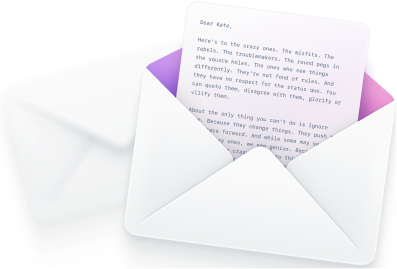

Oct 16, 2025 | 7 Min Read
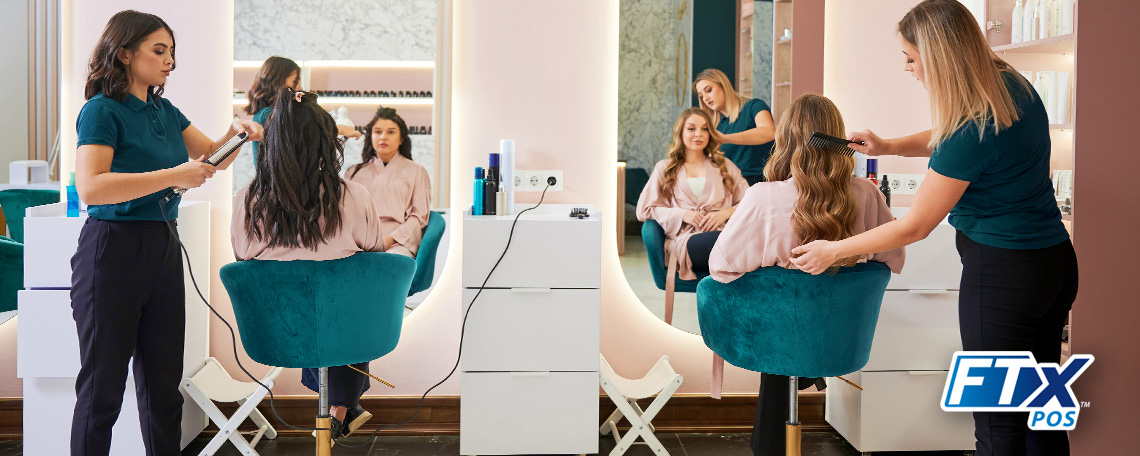
Jul 14, 2025 | 10 Min Read